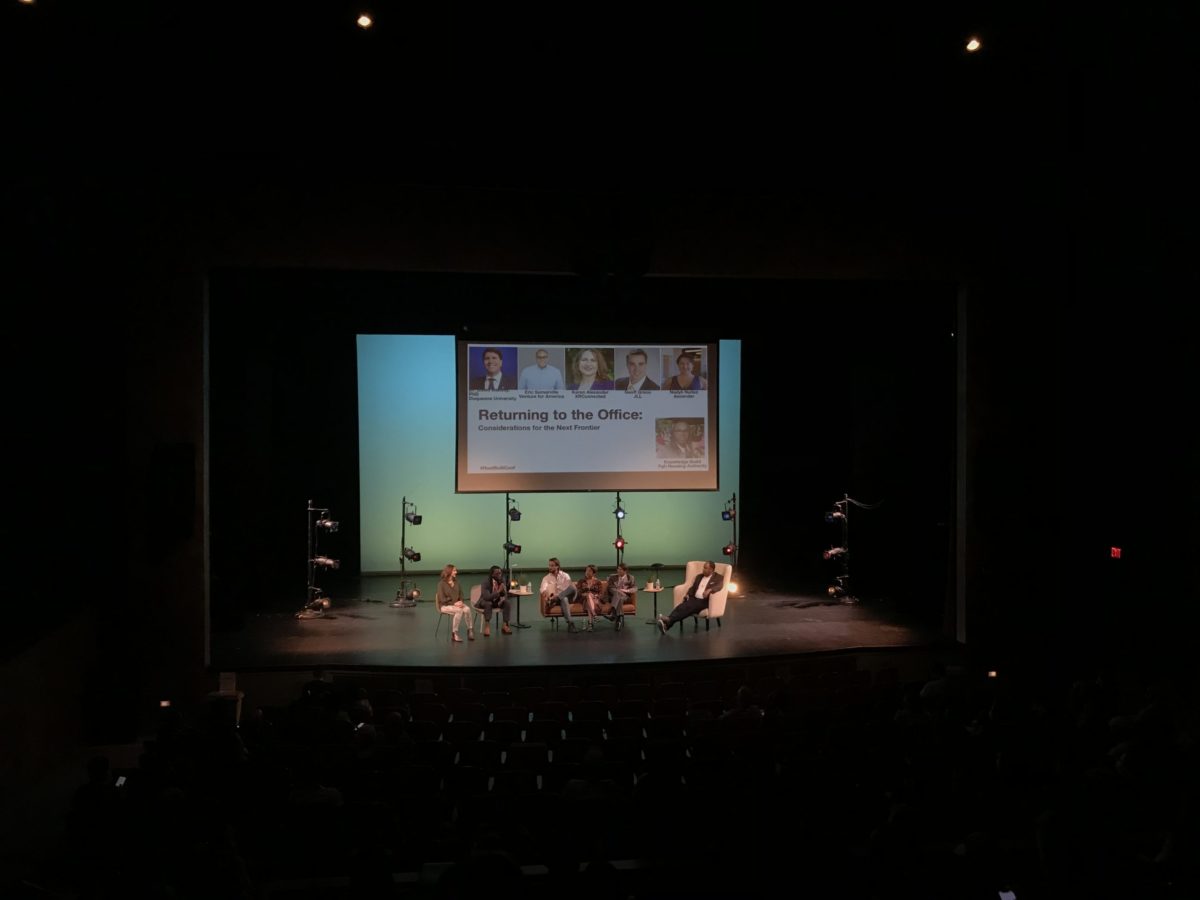One big question that hasn’t gone away over the last 18 months of the pandemic: What is the future of work?
The longer companies operate remotely, the more accustomed employees become to the pattern, and the more everyone starts to accept it as the new normal. But there are of course those who want to return to in-person work, citing workplace culture, networking and easier collaborations as advantages of face-to-face collaboration.
Earlier this summer, Technical.ly published a survey from Code & Supply showing that the majority of the local technologist respondents strongly favored continuing remote work after the pandemic. But other reporting in recent months has also shown that some of Pittsburgh’s biggest companies are pushing to have at least some in-person presence.
That debate continued at the inaugural RustBuilt Pittsburgh conference last Friday, when leaders from local universities, real estate firms, nonprofits and coworking spaces came together to discuss plans for the future. Plus, the director of virtual reality company XRconnectED, Karen Alexander, joined to share insights on how that tech might soon be a staple of the American workplace. Hosting the discussion was Knowledge Build Hudson, a government relations liaison for the Housing Authority of the City of Pittsburgh.
Read excerpts from the conversation below, which have been edited and condensed for clarity.
Is Pittsburgh ready to get back to work? Are we ready to go to the office?
Nadyli Nuñez, executive director of coworking space Ascender: Statistically, we’re not. A larger percentage want to stay hybrid. We need to rethink [our approach]. The employees we’re bringing back to the office aren’t the same as the ones we had before the pandemic. Why don’t they want to come to work? What are we doing wrong?

Nadyli Nuñez. (Photo via LinkedIn)
Geoff Greco, VP of tenant advisory services at commercial real estate company JLL Pittsburgh: A lot of the conversations [with our clients] are around, how can we implement new tech into the space to make it accommodating for folks that want to have that hybrid model? That’s where discussions are still ongoing. There’s no perfect solution.
David Dausey, EVP and provost of Duquesne University: In some regards, it depends on what you do and what your role is. We’re a campus of 10,000 students and they need people there for them to assist. It’s a broader discussion even within organizations, because there’s a lot of nuance within those organizations in terms of who can go completely remote, telecommute or commute to the office.
Eric Somerville, CEO of startup fellowship program Venture for America: Are we ready? Probably not, because we’re still kind of discussing it.
How are you managing safety protocols in your organizations?
Somerville: When things were real dicey, [as we tried to] keep track and keep sync with all the info and best practices, we said, we’re going to pull back. My concern is two-fold. One, I’m certainly concerned about our fellows going into cities, but also the concern of how our fellows see the value of our organization if we don’t go back in person. Making the sausage happen is when we’re in person.

Eric Somerville. (Courtesy photo)
Dausey: Everything is a matter of probability and risk. We had to look at what do we know about the virus? What do we know about the probability of its spread? We had to sort of balance out those many considerations. Right now, we have a face mask mandate that has not been incredibly popular in all circles. We have a vaccine mandate for all students and employees. It’s a combination of carrots and sticks because you don’t want to create a police state, but you do want to keep people safe. We did a lot of carrots before sticks, but it does require a combination of both.
Nuñez: For us, our space is open entirely. One of the things we did was survey the community and ask them what they feel and get as many responses as possible, knowing that whatever we decide, we would explain the reason as to why. How can we be smart about it and sanitize the spaces to make people feel safe? We always accept and take that feedback seriously and adjust accordingly.
Greco: There’s split decisions. But I will say that the companies are thinking about adopting the “we” concept as opposed to the “me” concept — increasing collaborative spaces. Companies are looking into implementing new tech into the space that makes it easier for people to connect not just to others in the office but outside as well.
Do you see a lack of community in remote work environments?
Greco: When you hire a new employee and you hire them virtually, they don’t feel that sense of brand, based on client discussions we’ve had. It’s tough to do it virtually. Being tied to a tangible office and having that community around you — where it’s your first day and your boss takes you out for lunch or to happy hour with the rest of the team — you lose that sense of brand association. You need that human interaction, that human connection.

Greg Greco. (Photo via LinkedIn)
Alexander: One of the things that I did during the pandemic along with some colleagues was found an organization called XR Women, and we meet every week. We have built an enormous sense of community through that. It’s wonderful because we get to see our friends coming back.
Somerville: We looked to replicate all those points of connections that you would have in your community. We use Slack. We have one channel on the Olympics, one on general topics. We’ll have coffee chats online. Originally I was like, how are gonna maintain a sense of community? We’ve looked to counter that and say, “Let’s create a space in these times where folks can just kind of show up.” It’s not the same — I think we do lose a lot by not having an in-person community. But it’s been helpful to have people feel that sense of cohesion.
Nuñez: The whole purpose of community is that you’re being brought together. There are digital and in-person communities. You just have to remember that you can create community — the pandemic is just forcing us to rethink how to make community and what was making us successful when we were in person. We actually had some people who became more active when we provided a digital platform.
Sophie Burkholder is a 2021-2022 corps member for Report for America, an initiative of The Groundtruth Project that pairs young journalists with local newsrooms. This position is supported by the Heinz Endowments.Join our growing Slack community
Join 5,000 tech professionals and entrepreneurs in our community Slack today!
Donate to the Journalism Fund
Your support powers our independent journalism. Unlike most business-media outlets, we don’t have a paywall. Instead, we count on your personal and organizational contributions.

National AI safety group and CHIPS for America at risk with latest Trump administration firings

How AI is infiltrating labor union contracts, in Pittsburgh and beyond

How women can succeed in male-dominated trades like robotics, according to one worker who’s done it


